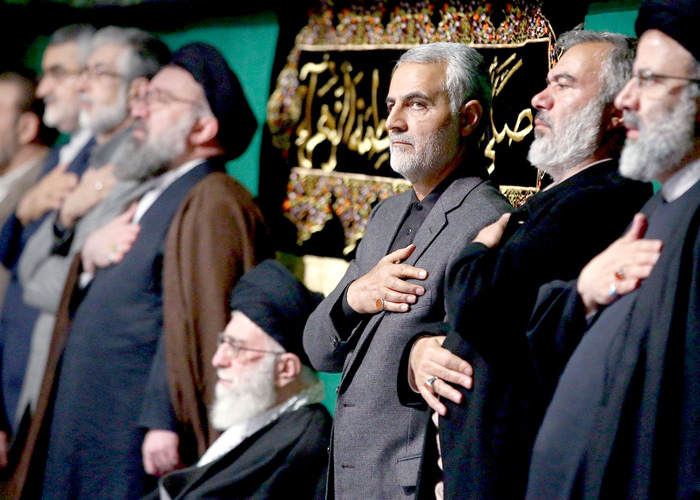Iran elections to have no effect on Lebanon, Syria
Alex Rowell/Now Lebanon/March 03/16
Gains made by President Rouhani’s allies will have limited impact even inside Iran, let alone the wider Middle East
Iranian Hassan Khomeini (C), grandson of the Islamic Republic of Iran
Parliamentary elections held Friday in Iran resulted in a seemingly significant setback for ultra-conservatives at the hands of a comparatively moderate camp led by President Hassan Rouhani, whose ‘List of Hope’ collected 95 out of 290 seats (33%), bringing the conservatives’ share of parliament down from 195 (67%) to just 103 (36%). The results have been hailed by much of the international press as a resounding victory for reformists, bringing hope for coming democratic change and a softening of Tehran’s hardline regime overall. Some commentators have even argued a now-emboldened Rouhani may seek to rein in Iran’s interventionist foreign policy in such countries as Syria, where militias under the command of the Iranian Revolutionary Guard Corps (IRGC), including Lebanon’s Hezbollah, have battled rebels since 2012. This optimistic reading of the elections is a misguided one, analysts told NOW, for two key reasons. First, though President Rouhani is often referred to in the West as a ‘reformer,’ in the Iranian context he is in fact deemed a ‘centrist;’ a distinction with important differences. Actual reformists formed only a minority of the candidates who ended up winning seats on the ‘List of Hope’ – indeed, a number of them were outright conservatives. Second, the structure of the regime is such that parliament holds little real power; its prerogatives being limited to select domestic issues, and even then susceptible to the veto of Supreme Leader Ali Khamenei and his self-appointed 12-member Guardian Council. While it’s true that centrists also scored victories against conservatives in the simultaneous elections for the 88-member Assembly of Experts – the body that would constitutionally be tasked with appointing a successor to the 76-year-old Supreme Leader should he die during its eight-year term – here too analysts said the influence of hardline conservatives was set to remain dominant overall.
‘Reformists’ against reform
The ‘List of Hope’ coalition endorsed by President Rouhani, widely but erroneously described as a ‘reformist’ bloc, is in fact a tactical alliance between centrists, reformists, and even certain conservatives, all of whom differ significantly on a wide range of political issues. This should come as little surprise, for bona fide reformists are an endangered species in today’s Iran. The three leaders of the reformist ‘Green Movement’ whose supporters were killed by the dozens by regime militias during protests against what they alleged were fraudulent elections in 2009 remain under house arrest, their names and photos forbidden from appearing in the media. In the run-up to Friday’s elections, more than 6,000 reformist candidates were banned from running by the Guardian Council, while some 640 were similarly disqualified from the Assembly of Experts, including the grandson of the regime’s founder, Ruhollah Khomeini.
Partly to make up for numbers thus lost, and partly because Rouhani is a centrist by conviction, the ‘List of Hope’ also fielded a number of conservative candidates for both parliament and the Assembly of Experts. Indeed, by some reports as many as half of the 16 Rouhani-backed candidates for the Assembly in Tehran were also running at the same time on the hardliners’ list. These included some distinctly anti-reform characters, such as Kazem Jalali, who has called for the execution of the Green Movement’s leaders, and former intelligence figures Mohammad Mohammadi Reyshahri and Ghorbanali Dorri-Najafabadi, both believed to have had roles in the murder of dissidents. Paul Bucala, Iran analyst at the American Enterprise Institute’s Critical Threats Project, was putting it politely when on Sunday he wrote, “the Reformist-moderate alliance that won many seats is not unified behind Rouhani’s approach to governing.”
Foreign policy out of parliament’s hands
While the centrist-reformist gains in parliament undoubtedly have symbolic value, their tangible translation into real-life policy is destined to be minimal, given the limited power afforded parliament in the makeup of the overall regime. In the few areas it’s able to wield influence – chiefly economic and social matters – its decisions are still subject to the veto of the Guardian Council. During the presidency of the comparatively moderate Mohammed Khatami (1997-2005), the Council routinely blocked legislation passed by parliament in this manner. Practically every core element of the so-called ‘deep state’ lies beyond parliament’s influence. While it ostensibly sets and apportions the state budget, it has no control at all over the substantial finances of the Supreme Leader or the Revolutionary Guard (whence the funding for transnational groups such as Hezbollah derives). Nor does it hold sway over the various internal security forces, or the powerful judiciary, notes Dr. Haleh Esfandiari, Founding Director of the Middle East Program at the Woodrow Wilson International Center for Scholars. The same holds for foreign policy. Members of parliament “hardly ever even speak about critical foreign policy issues such as Lebanon, Syria, Iraq, Hezbollah, or relations with the US, except (esp. in the case of the US) to endorse the official line,” Esfandiari told NOW in an email. “None of that is going to change.”Instead, as Esfandiari wrote Monday, “When it comes to internal security, human rights, political freedoms, and major foreign-policy issues, the course will not be set by parliament or the president but by the supreme leader and the security agencies and Revolutionary Guard commanders on whom he relies.”
Change still far off
Iranians under 30 years of age today comprise 60% of the population of nearly 80 million. There’s little doubt that these younger citizens, who made up the bulk of the Green Movement’s demonstrators seven years ago, are increasingly at odds with the largely geriatric ruling elite. In the long term, this may well bode unfavorably not just for Iranian conservatives, but for the very foundations of the theocratic dictatorship itself. In the short and medium terms, however, the ruling clerics’ position looks secure, analysts say. In the event that Supreme Leader Khamenei – who underwent prostate surgery in 2014, and is said to remain in poor health – should die, his replacement by a likeminded reactionary is guaranteed not just by Friday’s reelection of a predominantly conservative Assembly of Experts, but by the de facto influence of a tight-knit ruling cabal that, more than ever before, includes the IRGC.
“When Khomeini died in 1989, a small inner circle basically made the decision on the succession, claimed they had Khomeini’s imprimatur for the selection of Khamenei, and the Assembly simply rubber-stamped the decision,” Esfandiari told NOW. “My own expectation is that the Rev. Guards commanders will this time play a role in choosing the next Leader.” Lebanese analyst Hassan Fahs, son of the late Shiite cleric and activist, Sayyid Hani Fahs, concurred, telling NOW, “Of course [the next Supreme Leader] will be another conservative, and the [IRGC] will play the key role in determining him.” Likely candidates according to Fahs include Sadeq Larijani, the current head of the judiciary, and his predecessor, Mahmoud Hashemi Shahroudi. Given this expanding clout of the IRGC – whose external Quds Force commander Qasem Soleimani is nowadays seen almost every week directing sophisticated Islamist paramilitaries on frontlines across Iraq and Syria – it is very difficult to see the hardliners’ grip on the vital levers of power being supplanted any time soon. Iranian moderates will undoubtedly celebrate the symbolic message sent by their votes on Friday, as well as the economic benefits that will accrue from the lifting of sanctions and the liberalization of the economy. But for Lebanese, Syrian, Iraqi, and other Middle Eastern opponents of Iran and its allies, it will be business as usual.
**Amin Nasr contributed reporting.



















